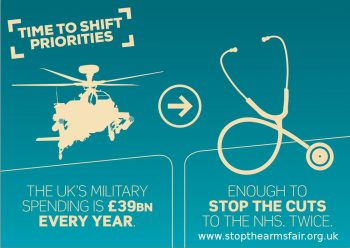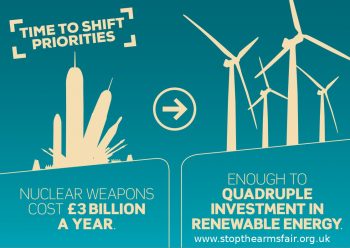Who pays for high military spending?
 We need to make explicit the choices our politicians are making: They are choosing to protect military spending from the cuts and to keep the UK’s spending on weapons the fourth highest in the world, while subjecting public services to vast cuts.
We need to make explicit the choices our politicians are making: They are choosing to protect military spending from the cuts and to keep the UK’s spending on weapons the fourth highest in the world, while subjecting public services to vast cuts.
They are choosing to perpetuate their conflict and aggression, that has seen tens of thousands of civilians killed in Afghanistan, and hundreds of thousands of lives lost in Iraq. In the UK, they are choosing to make hunger a daily reality, to increase homelessness, and to devastate lives by stopping sick and disabled people’s access to social security. They are choosing to limit our access to healthcare and to cut local services.
Despite cuts to vital public services, Phillip Hammond felt it fit to announce a £160 billion weapons shopping list at the start of this year.
Military spending has played a central role in the debt crisis throughout Europe. As the Former Spanish secretary of defence Constantino Méndez put it: “We should not have acquired systems that we are not going to use, for conflict situations that do not exist and, what is worse, with funds that we did not have then and we do not have now.” In Greece, Cyprus and Spain, high levels of military spending played a significant role in creating their debt. Meanwhile, their creditors continue to hawk more weapons sales – all the while demanding drastic cuts to social spending.
High military spending is an investment in a militaristic vision of security that only undermines human safety and security. It is our role to shape an alternative vision: one that starts with what we really need and tackles the root causes of conflict, rather than fuelling them. The Ministry of Defence tells us that the major threats it sees are terrorism, cyber-attacks and major accidents. So even on its own terms, there is no justification for nuclear weapons, aircraft carriers, and cold war style military procurement.

Spending on education and public transport creates double the number of jobs as investments in military. The number of jobs taxpayers pay £700 million to subsidise in the arms export industry is fewer than those we have already lost in the NHS. Investing in renewable energy instead of military research would create sustainable jobs in a vital industry – and tackle a genuine threat to human security, climate change.
At the arms fair, the US and UK will seek the next generation of weapons for their wars, while the arms companies aim to set the agenda for more exorbitant military spending. Yet we have can delegitimise arms companies’ drive for yet more military spending and show solidarity with struggles for justice around the world.
The time is right to challenge military spending and the arms fair is a key moment to do so. It’s time to shift priorities: away from military spending and towards meeting human needs.



No replies to “Who pays for high military spending?”